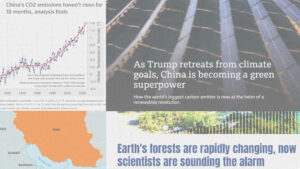On this segment of Frankly, Nate responds to the predicament of increased use of forests, especially in Europe, for heating fuel in the face of declining availability of Natural Gas and other fossil fuels. Will this be a ‘Terminal Deforestation Event’? What does this mean for the future of climate and accuracy of models? The importance of trees cannot be underestimated as we approach the end of cheap energy.
In French, we have a motto that says that a simple drawing is often better than a long explanation. Jean-Marc Jancovici Carbone 4 President
That’s very understandable because with left atmosphere thinking, one of the problems is that you see everything as a series of problems that must have solutions. Iain McGilchrist Neuroscientist and Philosopher
We can’t have hundreds and hundreds of real relationships that are healthy because that requires time and effort and full attention and awareness of being in real relationship and conversation with the other human. Nate Hagens Director of ISEOF
This is the crux of the whole problem. Individual parts of nature are more valuable than the biocomplexity of nature. Thomas Crowther Founder Restor
Show Notes & Links to Learn More
Download transcript00:47 – EU Vote to remove subsidies on pellets made of trees cut down specifically for that purpose
01:08 – Firewood sold out across Europe
01:58 – Homosapiens have been accessing forests for thousands of years
02:07 – Standing forest is ⅔ the size of pre-agriculture era
02:14 – There are 5 pools of terrestrial carbon: soil, trees, coal, oil, gas
03:19 – Increase in energy density from wood to coal to oil
03:41 – The mid-19th century the east US coast was mostly denuded, with vermont being 90% deforested
04:10 – We use more wood now than we did 150 years ago
04:43 – Home Heating in the USA: A Comparison of Forests with Fossil Fuels (Oil Drum Post)
05:05 – Standing stock in the US grows at 2.5-2.8%/year (compared to 3% 50 years ago)
05:48 – Only 10% of forest harvested is used for heat in the US
05:54 – The majority source of heating in the US is natural gas, followed by distillate
06:11 – Graphs used in this section of video (1, 2, 3,)
07:07 – Hardwoods are the only suitable wood for home heating and are 40% of forest stock
09:09 – Many historical societies had to denude their lands
09:20 – Haiti vs Dominican Republic deforestation
09:55 – Forests offer enormous ecosystem services
10:21 – Forests sequester 60% of carbon emissions (15% subtracting emissions from deforestation)
11:19 – 1910 was the first year that wood was not the number one fuel source
11:42 – The Amazon forest is a net source of carbon emissions
More: UK power station owner cuts down primary forests in Canada







